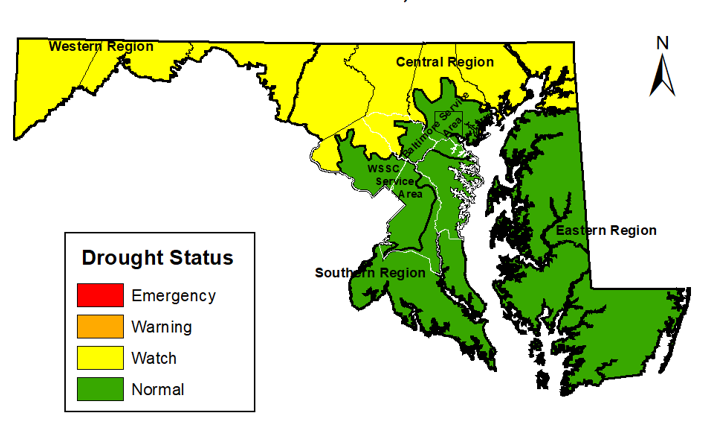Maryland Department of the Environment Encourages Water Conservation with Drought Watch for Portions of the State
Maryland Department of the Environment Encourages Water Conservation with Drought Watch for Portions of the State
Watch Issued for Western Maryland and Portions of Central Maryland; No Mandatory Water Use Restrictions in Place but Voluntary Reductions Encouraged
BALTIMORE (July 10, 2023) – The Maryland Department of the Environment is urging citizens and businesses in a large part of the state to voluntarily reduce their water usage as a drought watch has been issued.
“Water conservation is a good practice year-round, but we are asking residents and businesses to pay particular attention during the summer months when the State can experience hot and dry conditions,” said Maryland Department of the Environment Secretary Serena McIlwain. “You can do your part by limiting the use and duration of sprinklers for lawns, taking short showers as opposed to baths, and not leaving the faucet running while brushing your teeth. These things sound simple, but it all adds up.”
A drought watch has been issued for Western Maryland and portions of Central Maryland based on lower-than-normal stream flows and groundwater levels for this time of year. During a drought watch, MDE increases oversight of water supply conditions and encourages voluntary water conservation practices. No mandatory water use restrictions have been issued.
The affected region includes Allegany, Baltimore, Carroll, Cecil, Frederick, Garrett, Harford, Howard, Montgomery and Washington Counties, except for areas served by the Baltimore City or Washington Suburban Sanitary Commission public water systems.

At this time, the State currently has enough water to meet the needs of residents and businesses, but water conservation measures are being encouraged to help avoid any future water shortages. Recent rainfall in the area is not expected to have a significant effect in reducing the precipitation deficit. Homeowners should consider water conservation measures listed in our fact sheet.
Recommendations on conserving water for certain types of businesses, such as restaurants and commercial buildings, are also available.
# # #
